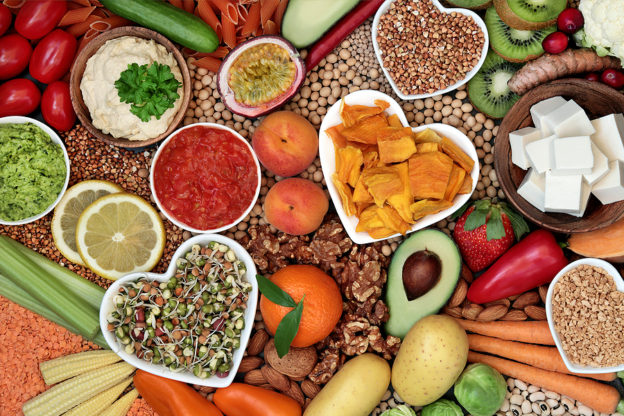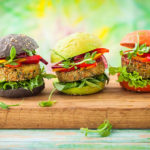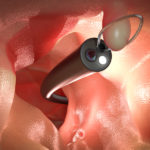By David Blyweiss, M.D., Advanced Natural Wellness
April 2, 2021
Covid has changed the way we eat. It had to.
You see, back when we didn’t have a potential life saving injection available, it didn’t take very long for people to realize that good nutrition and wholesome foods with supplementation when appropriate were some of the only tools in their arsenal to boost their immune systems and help fight against Covid-19.
As a result, a lot of people have become much more conscious about what they’re eating. The concept of “food as medicine” is finally going mainstream. And more and more people are joining the movement.
They are eating more antioxidant-rich plant-based foods that are loaded with vitamins and other nutrients. At the grocery store, they are choosing organic produce over commercial. Fermented foods that support the gut microbiome, where most of your immune system lives, are making a comeback.
If you’ve started adopting a new eating style that includes these types of foods, you may be wondering about a few things:
MD Exposes the Hidden Danger to Your Eyes

When your eyesight starts to fail, it's a real problem. Suddenly you can't go to the grocery store... you can't get to the doctor if you have an emergency... you can't meet your friends for dinner…
Your "regular" doctor doesn't have time to keep up with the latest research. And the same goes for eye doctors. They go to school to learn how to fit you for glasses and contacts, but have no way of preventing the damage and loss of eyesight that threatens your freedom and independence.
Let me show you something that explains a LOT about how your eyes work.
In my FREE Special Report, I'll show you a HUGE, untapped resource for your eyes that safely and naturally restores clear, effortless eyesight.
Click here to get started...
Where does meat come into play? Should I cut it out altogether? If I eat little or no meat, where will I get my protein from?
What to Eat Instead of Meat
Meat doesn’t need to be at the center of your plate at every single meal. In fact, I recommend you only make 15% of your diet contain meat. The other 85% should be whole plant-based foods.
You can easily satisfy the rest of your protein needs with a variety of natural, high-protein foods.
I add pulses like beans, peas and lentils to my meals. These are all low-fat sources of protein and fiber, so they aren’t fattening. Put them in soups, make bean dip, use them to top your salads or make your own chickpea hummus.
And nuts… I love nuts! I eat a handful of nuts every single night. And there are so many different types of high-protein nuts to choose from; almonds, pistachios, walnuts and more. (Remember, there are whole species of animals that survive just on nuts, like squirrels and chipmunks!)
Just a handful of nuts has such incredible health benefits that everyone should be eating more of them.
Seeds, too. There is a lot of energy and protein in seeds. After all, a seed has to grow a whole new plant, right? Toss them into your yogurt. Blend them into smoothies. Use them to top your salads and veggies.
Are You Suffering From...
- Love handles and a pot belly
- Romance that isn't what it used to
- Forgetfulness and inattention
- Low (or no) strength and endurance
- A sex drive that's shifted into neutral...or worse
If so...you may have Mature Male Burnout. Click here to discover more about this unique condition and what you can do about it.
Eggs are another excellent source of protein. It’s a myth that they’re bad for you. But it’s a good idea to keep your eggs intact (not breaking the yellows) to keep the cholesterol in the eggs from oxidizing. They are much healthier if you prepare them over easy, over well, poached or boiled.
Pastured eggs are the kind that I buy. They are, by far, the healthiest eggs you’ll find today.
Of course there’s always fish. I recommend cold-water, wild-caught fish. Cold water species aren’t just high in protein, they have a lot more omega-3 fatty acids than other fish. The omega-3s are what allow the fish to bend its body and swim. The colder it is and the deeper they swim, the more omega-3 fatty acids they make.
Among other things, this is one of the reasons why I’m not a big proponent of farmed fish in pools that aren’t cold. They just don’t generate the omega 3s, so you don’t get enough omega 3s when you eat them.
Beware of these Protein Sources
Grains are inherently inflammatory. So I’m not a huge whole grain person. And if they have glyphosate sprayed on them, they’re poisonous.
Glyphosate is used not only for the GMO crops it was developed for but for weed control and as a dessicant to improve drying time in some grains, even the organically grown wheat. When you eat these glyphosate poisoned grains, awful things happen to the most basic and critical metabolic processes in your body; from disrupting your gut microbiome and B vitamin and neurotransmitter production to increasing rates of cancer, specifically tripling the risk of a type of non-Hodgkins lymphoma called lymphocytic lymphoma.
If you feel the need to ocassionally include grains in your diet, I personally recommend at least sticking with gluten-free organic grains. I’m not crazy about the mouth feel of quinoa, but it’s a good source of protein. Millet and buckwheat are two other agreeable options. The Deland Millet breads are some of the best tasting toast ever. And a bowl of cream of buckwheat salted and sugared just right with fruit and a handful of crushed nuts of choice…mmmh, you will find the time to make it again after the first time.
Dairy isn’t your best choice for protein. Remember, we’re not baby cows. And the fact is, dairy is an allergen. Plus, today’s commercial dairy products are filled with drugs, hormones and antibiotics. So you’re better off to avoid them.
When you do choose to eat or drink dairy, make sure it’s an organic brand. It’s the safest way to go. But, the recent dairy free offerings are quite delicious with more choices now matching our taste buds from cheese to cream cheese to yogurts
And keep in mind that, while it’s always a good idea to keep your meat consumption low, there are ways to make consuming meat “safer”. I wrote all about it at the end of last year, so check it out.
SOURCES:
OPN State of Organic Produce 2020.
Marsh KA, et al. Protein and vegetarian diets. Med J Aust 2013; 199 (4): S7-S10.
Antunes AEC, Vinderola G, Xavier-Santos D, Sivieri K. Potential contribution of beneficial microbes to face the COVID-19 pandemic. Food Res Int. 2020;136:109577.
Samsel A, et al. Glyphosate pathways to modern diseases V: Amino acid analogue of glycine in diverse proteins. Journal of Biological Physics and Chemistry. Volume 16(June):9-46







